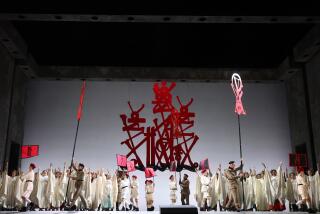Music Review : I Cantori at Pasadena Presbyterian Church
- Share via
Given the limitations of the hall and other technical shortcomings, a concert by the vocal ensemble I Cantori at Pasadena Presbyterian Church managed to offer some quality music making. Singing with conviction and insight, the eight-person mixed chorus presented a large, diverse collection of American vocal works from the 20th Century, giving intelligent attention to each work.
Five songs by Charles Ives, arranged for the group by conductor and founder Edward Cansino, yielded the best results. Use of props and other theatrical elements propelled the humor and flavor of the texts, most of them by Ives himself.
Overall, the presentations Wednesday night resisted an easy temptation for corniness, thoughtfully projecting Ives’ sophisticated, sometimes eccentric view of popular Americana. Flutist Lisa Edelstein fittingly supplied a part originally for fife on the piccolo.
Similarly, a Suite from “Treemonisha” by Scott Joplin became a theatrical presentation with dancing, sequined skimmers for the men and feather boas for the women. The toe-tapping, ragtime songs joyfully set the joint a-jumpin’ although at times pianist Lorna Eder and percussionist Timm Boatman had a hard time synchronizing with the ensemble.
Giving them a different kind of a challenge, two pieces for extended vocal techniques by Joan La Barbara--arranged for I Cantori by the composer--produced varied results. The better of the two, “Time(d) Trials and Unscheduled Events,” cleverly satirizes the running events of the 1984 Olympics, for which it was written, with pantings, coughs, grunts and groans carefully composed into a fugue of sorts.
And there was a world premiere, Cansino’s eclectic quodlibet “Design.” Familiar vocal pieces throughout history are layered together sometimes cacophonously, other times with simplicity. A reflective text by Marcel Proust attempts to tie the piece together, but falls short of giving the work a clear purpose.
Solo efforts included a set of chilling atonal songs by George Rochberg with mezzo Sondra Stowe spellbindingly bringing out all the grotesque images and obsessions in short texts by Rochberg’s late son.
But the intricacies of George Crumb’s “Madrigals, Book II,” sung by soprano Diane Thomas were lost due mostly to the boomy hall, but also a general lack of energy.
More to Read
The biggest entertainment stories
Get our big stories about Hollywood, film, television, music, arts, culture and more right in your inbox as soon as they publish.
You may occasionally receive promotional content from the Los Angeles Times.










